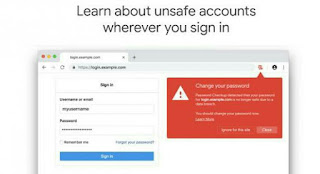Google has released two updates to mark Safer Internet Day which would protect user data, including usernames and passwords. One of them is a neat extension for the desktop version of Chrome, while the other is called Cross Account Protection.
Google has gathered a massive dump of 4 billion compromised credentials to keep your username and account safe from hackers and attacks. When you install the extension called Password Checkup, it matches the data you’ve shared with Google with the one typed in and tells you if any of the entries was hacked. If it suspects any of your entries to be hacked, it will trigger an automatic warning and suggest changing your password.
There are needs to protect your usernames and passwords especially the ones getting into your Google Account, gj if you store card data, accounts for online banking and other sensitive information. Some protections haven’t extended to the app you use for Google Sign In, so Cross Account Protection comes in handy.
According to Google "We built Password Checkup so that no one, including Google, can learn your account details. To do this, we developed privacy-protecting techniques with the help of cryptography researchers at both Google and Stanford University."
Password Checkup is a Chrome extension that will detect whether the username and password you’re using to login to an online account or service have been stolen. If either has, an alert will pop up in your browser, advising you of the breach and suggesting you change your password.
Although Google can implement protections if you’re using its services and it thinks you’ve been hacked, before the introduction of Cross Account Protection, Google was unable to implement the same security processes. However, now it will share any breach data with the third party, so they can take action, such as forcing you to re-login.
But instead of leaking all kinds of sensitive information, the breached host will only know the fact of security event happening and when that occurred. The feature was developed with Adobe, Internet Engineering Task Force, and Open ID Foundation.
Thursday, February 14, 2019
Subscribe to:
Post Comments (Atom)







No comments:
Post a Comment